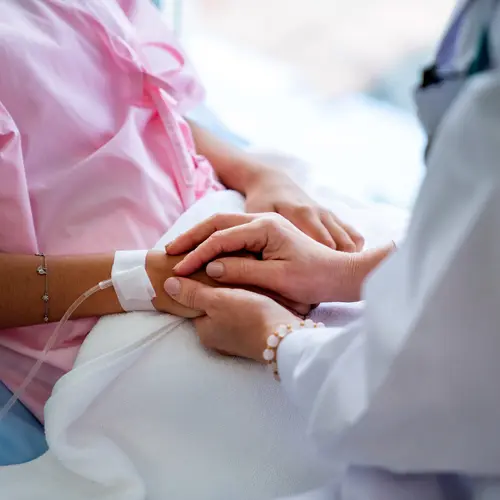When your chemotherapy is over, you may feel a wave of conflicting emotions. Learn how to manage your changing moods, and keep in mind that recovery takes times.
Amber Kostelny, a professional organizer in Chicago, found she had mixed feelings after her chemotherapy for breast cancer.
"I honestly felt like I had been through a war or a long fight. I was exhausted emotionally but exhilarated," she says. Just days after the last chemo treatment, her doctor gave her a clean bill of health. "I felt like the cloud had lifted."
Everyone's different. You may feel happy, relieved, lonely, scared, sad -- or all of the above.
"A wide range of emotional reactions are normal after chemotherapy," says Nicole Taylor, PhD, who runs the Center for Oncology Psychology Excellence at the University of Denver. "Some people are thrilled to be done, and others struggle to adjust to their new normal."
Try some simple tips to help you stay grounded.
Ask for Support
Some folks may worry their cancer might come back. If that sounds like you, talk to your friends and family. Now that treatment is over, they may think you don't need their support anymore. Tell them it's still important.
Join an online or in-person support group. You'll get a chance to talk to others who understand what you're going through.
A trained counselor can help. "Reach out if you feel depressed, anxious, or if you're having trouble adjusting to post-cancer life," Taylor says.
Know What to Say
You may field a lot of questions from well-wishers about your health. Although it's nice to be at the center of attention, sometimes it can be a bit overwhelming.
Ashley Love Sumrall, MD, chief of neuro-oncology at the Levine Cancer Institute, suggests creating a brief response like, "I'm doing as well as can be expected. I appreciate your concern." Or try posting updates on a website or social media account.
Save Energy
It's common to have fatigue after chemo. Kostelny remembers being so tired, she'd fall asleep at 7 p.m., hours before her husband. But eventually her energy returned and she could stay up until 10 or 11 p.m. "I'd smile going to bed late with him because it meant I was better," she says.
To store up your energy:
- Take naps.
- Rest between activities.
- Wake up and go to sleep at the same time every day.
- Let others help with cooking and errands.
Use Tools to Help Focus Better
You may notice some changes to the way you think after chemo. You might forget things or find it hard to concentrate. It's so common that there's a name for it: chemo brain.
Try using a daily planner or smartphone to keep track of appointments, errands, important dates, phone numbers, and notes.
Some simple changes can help your daily routine:
- Plan ahead.
- Write things down.
- Set reminders.
- Don't take on too much.
- Keep your days simple and manageable.
Try Relaxation Techniques
There are lots of methods that can help with stress, depression, or anxiety. You might want to try one of these:
- Massage
- Tai chi
- Yoga
- Meditation
- Acupuncture
- Deep breathing
Control What You Can
You'll feel less afraid and more in control if you take action and create order in your life.
Make a healthy lifestyle plan with a good diet and plenty of sleep. Find ways to be active, with your doctor's guidance. Exercise relieves stress and tension, boosts your mood, and helps with fatigue.
Kostelny was a triathlete before she had cancer. Her doctor encouraged her to continue training -- at a much slower pace and shorter distance -- to keep her spirits up. It worked and helped her gear up for future races.
Talk Openly With Loved Ones
"Many times, family and friends are ready for everything to go back to normal after treatment," Taylor says. "For survivors, it doesn't always happen that way."
Communicate openly. Help family and friends understand how you feel. Be clear about how they can help.
Find New Ways for Intimacy
It's normal for sex and intimacy to change after chemotherapy. Be proud of your body for making it through treatment. Focus on what makes you feel attractive and confident. Be open to new ways of being intimate.
Talk to your doctors. "There are medications, therapists, and techniques to assist with sexual health," Sumrall says. If you feel uncomfortable about bringing it up, send an email or leave a message before your appointment.
Make Changes at Work
You may be ready to get back to your job, but you may also have some worries about how you look, fatigue, or changes to your mood or how you think. Talk to your treatment team. They may suggest lifestyle changes or medications that can help.
Be flexible. What worked before may not be a good fit now. Talk to your boss, your union, or your human resources department if problems come up.
"Job descriptions may need to be reviewed or updated," Sumrall says. "Returning on a part-time basis or working from home may be helpful when transitioning back to work."
Accept Help
You don't have to take on everything yourself, Taylor says. "Loved ones often feel helpless and are usually excited to help with a specific request. Ask for a simple visit, a ride to an appointment, or even help folding socks."
Be Patient
Try to take it one day at a time, says Dana Driskill, RN, an oncology nurse at the Stephenson Cancer Center in Oklahoma City. "Every day, your energy will improve and side effects from treatment will generally decline."

